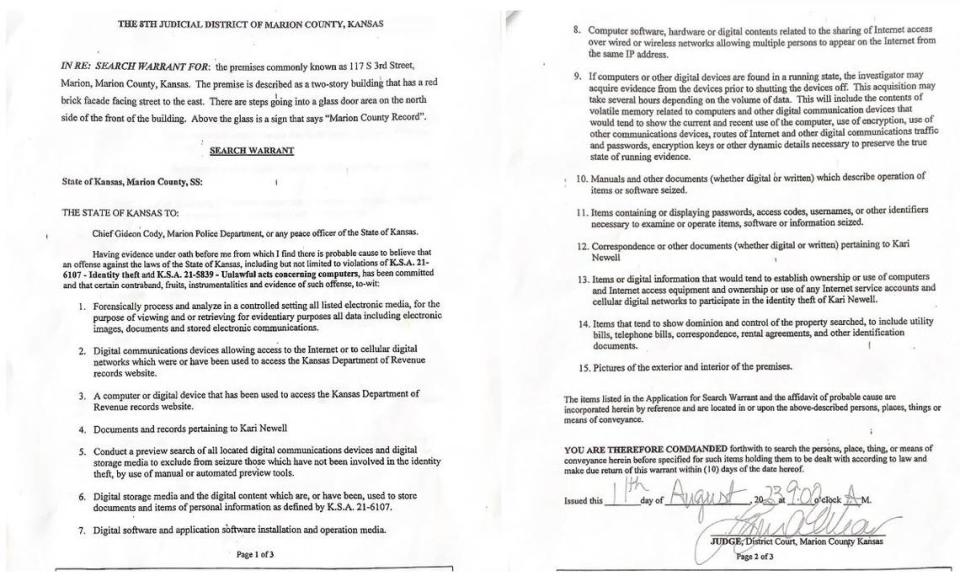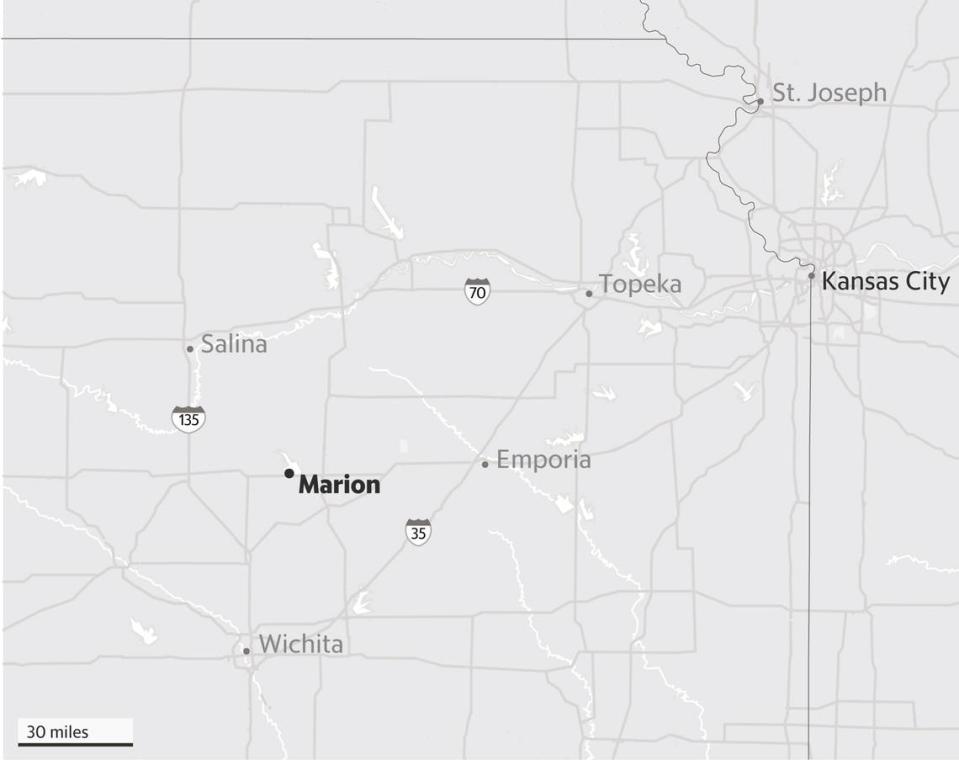When can police raid a newspaper like the Marion County Record? Here’s what the law says
Police in the small town of Marion, Kansas, set off a nationwide outcry Friday when they raided the offices of a local newspaper with a search warrant.
Police seized phones, computers and documents from Marion County Record reporters in the newsroom and seized personal electronics in the homes of the paper’s publisher and a local city councilwoman.
Marion is located in east-central Kansas, about an hour northeast of Wichita and two and a half hours southwest of Kansas City.
Press freedom advocates have condemned the search of the newsroom and two private homes, with one letter signed by over 30 news organizations calling it “overbroad and unduly intrusive.”
But what does the law say about police searches of newsrooms, and what protections do journalists have against seizures?
Police had a search warrant signed by a judge during their raid on Friday. But the rules around searching news organizations are different from private residences and other businesses due to a 1980 federal law.
Here’s an overview of the laws that could apply in this case.
How can police get a search warrant in Kansas?
Kansas law states that a magistrate judge may issue a search warrant when any person under oath informs them of “facts sufficient to show probable cause that a crime has been or is being committed” and describes “a person, place or means of conveyance to be searched and things to be seized.”
Under the law, police can seize any items that they think were used to commit a crime or resulted from a crime.
The search warrant in the Marion County Record raid, which was signed by Magistrate Judge Laura Viar and obtained by the Kansas Reflector, lists 15 types of documents police were instructed to seize.
These included “documents and records pertaining to Kari Newell,” a local restaurant owner who had recently accused the newspaper of obtaining information about her past DUI conviction “illegally.”

Police can also arrest anyone at the site that has an arrest warrant out for them — but the search warrant alone is not the same as an arrest warrant.
In general, search warrants can apply to businesses, vehicles, private residences or other locations.
But newsrooms are a special exception — the rules around searching them are stricter because of a federal law protecting news organizations.
Is a search warrant enough to raid a newsroom?
Not always. A 1980 law called the Privacy Protection Act makes it illegal for law enforcement to seize materials used by journalists for their work using a simple search warrant alone.
Instead, law enforcement must get a court subpoena for the documents they want to review — meaning the documents must be related to a court case.
According to the nonprofit Electronic Privacy Information Center, which advocates for digital privacy protections, documents seized improperly from a news organization can still be used as evidence in court — but the news organization can sue the law enforcement agencies that seized them.

The only exceptions to this rule are if documents held by a news organization are “necessary to prevent the death of, or serious bodily injury to, a human being,” if the reporter in question is suspected of committing a crime or if law enforcement believes the documents will be destroyed if they aren’t seized immediately.
What crime is the Marion County Record accused of?
According to the search warrant, Judge Viar had “probable cause to believe” that someone was committing the crimes of “identity theft” and “unlawful acts concerning computers.”
Here’s a closer look at the state’s definitions of these crimes:
Identity Theft: This crime is broadly defined as obtaining, possessing or using personal identifying information about someone with the intent to defraud them or “misrepresent” them in order to bring them “economic or bodily harm.”
Unlawful Acts Concerning Computers: This crime is mostly related to cybercrimes like hacking. However, one provision mentions using a computer “to defraud or to obtain money, property, services or any other thing of value by means of false or fraudulent pretense or representation.”
Both of these crimes are severity level 8 nonperson felonies, and each carry a sentence of around 10 months probation.
The punishment for each crime jumps to a severity level 5, punishable by around three and a half years in prison, if the person suffers a monetary loss of over $100,000 due to the crime.
Do you have more questions about legal protections against search and seizure in Kansas or Missouri? Ask the Service Journalism team at kcq@kcstar.com.

